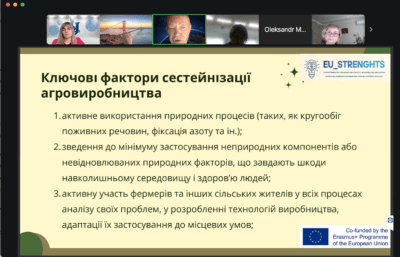On October 25, as part of the Faculty of Economics and Management Week, an open lecture titled “Digital Transformation in Agricultural Production: EU Experience” was held for students and faculty at Sumy National Agrarian University. The event was conducted by Professor Leonid Melnyk, who discussed innovative approaches and technologies in agriculture that are actively utilised in the EU to achieve sustainable development goals.
The lecture emphasised the importance of integrating digital technologies in agriculture to meet sustainable development objectives, including food security, environmental protection, and improving social conditions for agricultural workers. Innovative digital solutions in the agri-sector help make informed decisions, leading to more efficient use of natural resources and reduced adverse environmental impacts.
This event highlighted the results of the Jean Monnet Chair ” Strengthening EU Leadership and Capacity in Science and Innovation” (101175767—EU_STRENGHTS—ERASMUS-JMO-2024-HEI-TCH-RSCH), which has been implemented since September 2024 at the Department of Economics, Entrepreneurship, and Business Administration at Sumy State University, under the guidance of Ph.D., Associate Professor Inna Koblianska. The project aims to enhance the EU’s leadership and scientific innovation potential while promoting the EU experience in science and innovation.
The lecture was attended by students and faculty from Sumy National Agrarian University, including students of specialities “Economics” and “Entrepreneurship, Trade, and Exchange Activity.” The lecture involved undergraduates, master’s students, and faculty from the Department of Economics and Entrepreneurship, named after Prof. I.M. Bryukhovetsky of Sumy National Agrarian University
We sincerely thank the colleagues for the invitation, active participation and collaboration in disseminating European experience and fostering joint educational and scientific initiatives.
Funded by the European Union. Views and opinions expressed are however those of the author(s) only and do not necessarily reflect those of the European Union or the European Education and Culture Executive Agency (EACEA). Neither the European Union nor EACEA can be held responsible for them.


